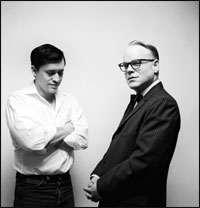 Oscar winning films. I tend to shy away from them. When the hype is all around I generally avoid seeing them at the cinema and sometimes I don't watch them for at least a couple of years after they were feted. For instance, I only recently watched Hotel Rwanda, which incidentally I thought was excellent. But on the whole most Oscar and awards-laden films turn out to be not quite as good as they were painted at the time. A great example of this is American Beauty, which is a well made, well acted and an almost utterly predictable and shallow experience. The test of whether it is truly engaging is that in many scenes you find yourself going "That's Chris Cooper! And Look, it's CJ Cregg!" Satire of modern life used to mean Norman Mailer or Joseph Heller. Now we have the towering talent of Alan Ball. Oscar for lighting design maybe.
Oscar winning films. I tend to shy away from them. When the hype is all around I generally avoid seeing them at the cinema and sometimes I don't watch them for at least a couple of years after they were feted. For instance, I only recently watched Hotel Rwanda, which incidentally I thought was excellent. But on the whole most Oscar and awards-laden films turn out to be not quite as good as they were painted at the time. A great example of this is American Beauty, which is a well made, well acted and an almost utterly predictable and shallow experience. The test of whether it is truly engaging is that in many scenes you find yourself going "That's Chris Cooper! And Look, it's CJ Cregg!" Satire of modern life used to mean Norman Mailer or Joseph Heller. Now we have the towering talent of Alan Ball. Oscar for lighting design maybe.On second watch I was not sure I liked Capote as much as on first watch. Like everyone, I think, I was initially mesmerised by Philip Seymour Hoffman's central performance. It was one of those roles that fell together perfectly. Nobody else alive could have played it. It was one of those, that from the very idea, was his awards season performance. Everyone likes him and even in duffers like Along Came Polly he puts in a terrific turn. Capote was the role that meant people felt justified in giving him a prize, because we all know he's brilliant.
The problems in the film lay, I think, in the pacing. How difficult it always is to portray writing without resorting to cliches. However, I felt that the film could have been slightly pacier and actually longer than it was. Because the film was keen to compress a number of years, the failing relationships with both Jack Dunphy and Nell were skated over somewhat. I got little sense of Nell and Truman's real closeness apart from the the early scenes when they laugh conspiratorially together at Truman's jokes, when, it could be argued, this was one of the central relationships in modern literature. That two next door neighbours could both produce staggeringly good writing is almost unbelievable. I want to know more about how that could be.
On second viewing, Hoffman's performance is still brilliant. But it towers so far above the rest of the film that it eclipses everyone else. To be harsh - the other performances are merely functional. It takes a lot to eclipse Catherine Keener, but her Nell appears small and uncomplex. Clifton Collins is also forgettable as Perry Smith. I found myself bored by his meaningful nasal breathing and long pauses - something that Hoffman manages effortlessly because he acts the pauses as well as he acts the lines. He didn't really give off the ambiguity acribed to him in the film - both as an object of desire and as a sensitive man who could kill at a moment's notice. How brilliant would a young Sean Penn have been in the role, or Edward Norton? Similarly Bruce Greenwood, who is too familiar an actor of mini-series status to add any real gravitas to Jack Dunphy.
Lastly, the music was poor. Screechy violins - not to my taste. Too unmemorable. I would have liked to see a simple contrast in music. i.e. music for Truman's life; no music for things that are reflections of the novel. The hanging scene would have been so much more powerful without incidental music. It was the perfect non-fiction moment in the film and did not need adornment. I also found the central argument of the story a little simplistic. If anything, I wanted a much broader canvas. Capote the writer, as well as Capote the celebrity deserved more exploration.
No comments:
Post a Comment